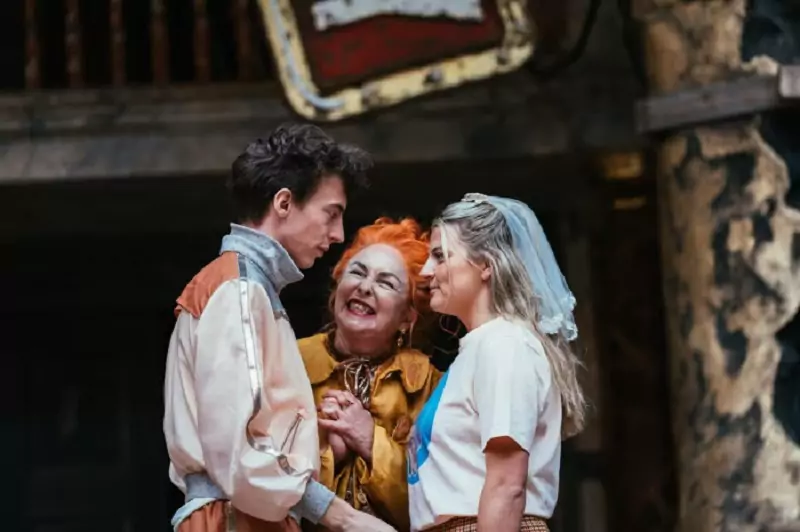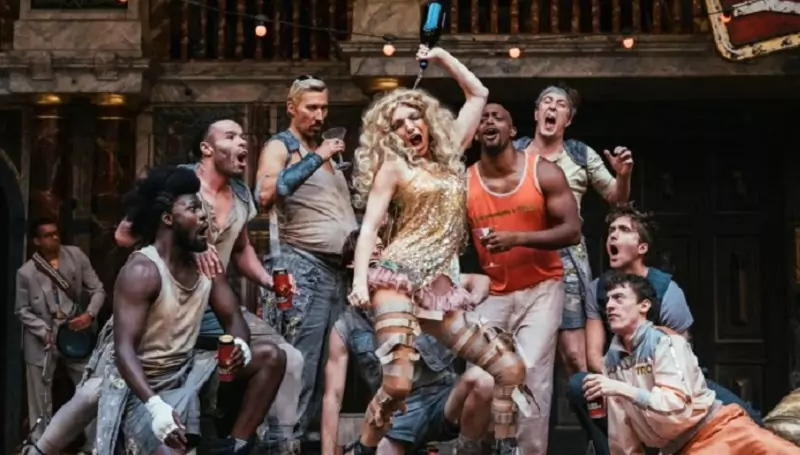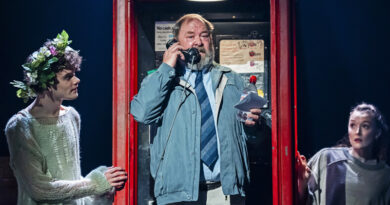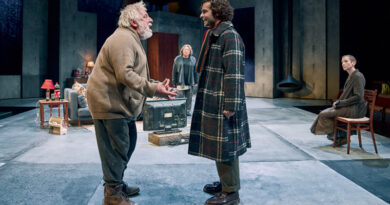“Troilus and Cressida”, Globe Theatre
Jeremy Malies on the South Bank
7 October 2025
★★★★☆
One of the Greek princes comes on wielding a six-iron and I wondered if the evening would be knockabout. I also knew that Troilus and Cressida is not a play that lends itself to a specific time or place. The set by Ryan Dawson Laight is midway between A Funny Thing Happened on the Way to the Forum and M.A.S.H. I thought (uncharitably) that Vietnam might be overdone as a reference point. Giraudoux and Euripides (23 centuries apart) both wrote anti-war plays depicting the Trojans so there are authoritative examples. The inventive design here has a jokey signpost showing distances to Greek locations such as Sparta and Ithaca. We are in a realm of perceptive spoof that brings out the core messages.

Kasper Hilton-Hille, Samantha Spiro and Charlotte O’Leary.
Photo credit: Helen Murray.
Director Owen Horsley, who has worked on other war plays such as Henry V and Macbeth, takes aim at an array of issues moving beyond war to sexual politics. But he knows that sex and warfare have much in common and that there can be everything from full-on affairs to a mild erotic charge between soldiers. Horsley leaves it up to us to apportion blame over Helen’s departure from Sparta. Has Paris (Matthew Spencer) stolen her from King Menelaus (also played by Spencer so setting up interesting parallels) in a blatant act of kidnap or do matters sit somewhere between cuckolding and marital breakdown? Whatever the details, we are seven years into a messy war as an upshot.
The production has thoughtful and versatile performances throughout. Spencer is not the only actor to double up. Most notable is the shape-changing Lucy McCormick who plays both acerbic, potty-mouthed, and crippled Thersites (more gender-swapping) and the pivotal role of Helen whom she depicts as a gameshow hostess with some of the invective in the first role carrying through. Helen is trapped by a series of circumstances that she can’t escape and McCormick conveys this well. Perhaps the intention here is to stress that everybody in the two societies depicted is playing a role rather than simply being themselves? And Helen is (without her knowledge) being used as a propaganda machine.
There is yet more changing of genders. The most successful is to have Samantha Spiro (Pandarus) as Cressida’s aunt rather than uncle, and while Spiro suggests relish at the prospect of the two young people coupling, she is less yukky and voyeuristic than the part as written. Spiro (using Barbara Windsor-ish tones as she watches the lovers) nails the self-knowledge that is a major aspect of her role.
Chemistry between the title characters, played by Kasper Hilton-Hille and Charlotte O’Leary, is indisputable even to the point of there being a charge between the pair as they stood many yards apart on platforms while being drenched on press night by Storm Amy. And O’Leary even survives odd clothing decisions by costume supervisor Laura Rushton including being put in a frumpish tweed skirt for her tryst. Perhaps the point is that she can’t wait to take it off? Elsewhere, Rushton helps us with subtle colour coding of tracksuits to tell us who is who which I found preferable to the 2012 Wooster Group/Royal Shakespeare Company production (the only other version I have seen) in which the Greeks were modern-day soldiers and the Trojans dressed as early 19th-century Native Americans.
There was logic to Ulysses also being played as a woman, at least in terms of this interpretation by Horsley and actor Jodie McNee who projects the character’s feared manipulative intelligence from the persona of a strategic and merciless blue stocking. Does the character really believe what she is espousing in the set-piece speech about “degree” when she says that the only way the Greeks will prevail against Troy is if they continue to respect army hierarchies? In the absence of degree, “son should strike his father dead”. I thought about the many recent instances of mutiny and shooting of officers by Russian troops in Kharkiv.
I liked what Emma Woodvine (credited for voice and text) has the cast do with the verse. They all sit on the pulse of their speeches without being predictable or formulaic (even in question and answer routines). They are, to quote Ulysses as she imagines a conversation between lovers Achilles and Patroclus in their tent, “dainty” with the verse-speaking. Even with the dense imagery, formal speeches, and abundance of metaphor, Horsley keeps things rattling along.
This fluidity is mirrored in movement by Daniel Hay-Gordon with the comings and goings seeming spontaneous even in a plot that can get weighed down by all the conferences and the early parade of warriors. Here this smacked of Marvel comics, an element that delighted the younger groundlings prior to their soaking by rain which, borne on the storm, impacted everybody in the venue.
The production has a brash, bold Las Vegas-type energy and sexual charge which seduced me. It pits chivalry (Trojans) against brutal opportunism (Greeks) and is disturbingly topical. There are so many broad points of contact with modern life, notably the skewering of hero worship and ideals of political leadership that I could hardly credit this as a text from 400 years ago.
Walking back to Blackfriars station I eavesdropped on a young American couple. One of them said, “I wish I’d brought my SparkNotes along!” Well, that’s a legitimate and by no means low-brow response and it showed engagement. The study guide would have told them how many sensible changes of gender there had been here and got the pair thinking about the love matches, conflicts involving fidelity, respect for the old, and debate over what is worth fighting for. I hope the general winning quality of this production enthuses young theatregoers and that Horsley’s intelligent risk-taking inspires new directors.









